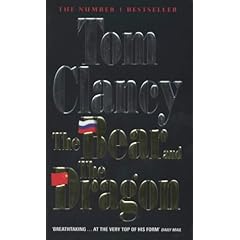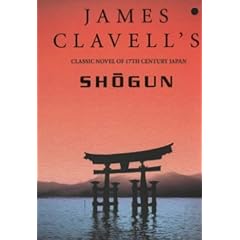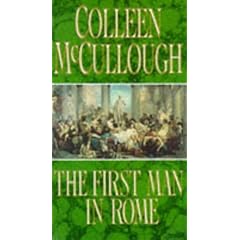



Call it the anticipation of several days, weeks or even months of reading pleasure to come or the comfortable heft of a meaty tome under my arms but I love big books. They have to be novels of course. Fiction definitely. Epic tales unfolding over decades or centuries preferably. My first large book was Shogun, James Clavell's saga set in 16th Century feudal Japan. I carried that brick of a book around for months, spending many a splendid hour immersed in its riveting tale of a shipwrecked English sailor who gets sucked into the impending war between 2 rival warlords, becoming a confidante of one and the lover of a married samurai noblewoman.
So, it could well have been my pleasant first experience with a hefty tome, but to this day, I still seek out big tales, running well past the 800 page mark, demanding undivided reading focus (I, not belonging to that band of multi-tasking bookies who can juggle up to 3 different books at a time) and generally taking up my reading life for weeks on end.
Larry McMurtry's Lonesome Dove was another source of unadulterated pleasure derived from a long epic tale, this one chronicling a massive cattle drive from Texas to Montana. Vivid characters occupying a panoramic, post Civil War landscape of pure Americana acting out scenes of nail biting tension co-existing with ones of unbearable heartbreak, Lonesome Dove deposited me in Reader Nirvana as I sparingly parcelled out pages to read as the book drew to a close, a desperate attempt to prolong the joy of complete immersion in this spell binding Western.
Not all my encounters with big books yielded Reader's Gold, unfortunately...
Tom Clancy started out writing riveting thrillers that fused state of the art military and surveillance info married to a tight plot laced with geo-political overtones, and they rarely ran less than 600 pages. Then they got even longer (Executive Orders), sloppier( Without Remorse), increasingly Right Wing (Debt Of Honour, Rainbow Six) as they descended from thrilling to average, sliding down to ponderous and finally landing with a squelchy thud into GobShite (Red Rabbit, Teeth Of The Tiger) . The culmination, length wise was The Bear And The Dragon, a 1000 page plus arduous trek through mediocre prose that delivered, in spite of its unholy length, a fraction of the thrills in earlier Clancy novels. I call it The Bore And The Drivel.
And then there was Colleen McCullough's The First Man In Rome, the first in a now 7 book series on the rise and fall of the Roman Empire.
Pre-Julius Caesar and Post Etruscan and Punic Wars, it chronicles the rise of 2 men who would plot the course change of Rome from Republic To Empire; Gaius Marius, low born but brilliant military strategist and leader and Lucius Cornelius Sulla, of high born Patrician stock but penniless.
Novelisations of actual historic events require a deft touch. Especially one as well documented as the saga of Rome. Trawl a bookshop, browse through a library or random search the Net, and you'll be drowning in information deluge on the sheer amount of text that's been devoted to chronicling the minutiae of this once great civilization.
To make the actual reading of it a pleasure requires an adept touch at whipping and stirring up a tale of passion, ambition, treachery, political chicanery, epic battles and sex, elements that were in abundance during this period ( and pretty much any period in history book- ended by the rise and fall of a civilisation, if you want to argue the point) .
What McCullough serves up instead is an academic and episodic saga that never reaches the giddy depths it should. Her research is a Gold Star in meticulousness; Rome is brought alive in geography, people, customs, food and social hierarchy, complemented with a 100 page glossary that covers topics spanning from how long an actual toga was to the complex political machinery of the Senate, a half dozen maps and even sketches of some of the main players.
One wishes McCullough brought the same attention to giving you a riveting historical epic. There are flashes of brilliance, sadly counterbalanced by a sluggish pace, a grave misstep in a book that stretches well past the 900 page mark. The poisonously intriguing Sulla, who sleeps with both his step mother and mistress before murdering them in cold blood is given short shrift, playing second fiddle to Marius, sketched 2 dimensionally as a brilliant general in the opening pages and never attains any depth beyond that for the rest of this long book (although one supposes that Sulla will come into prominence in the second and third book as his friendship with Marius gives way to a bloody feud later.).
Of the 3 key battles dominating this period in the Republic, 2 are given short shrift: the war against Numidia culminating in the capture of King Jugurtha and the final battle against the Germanic tribes which seals Marius' position as the most powerful man in Rome. Peculiarly, it is the middle battle, the Roman armies rout by the Germans that McCullough chooses to flesh out in more detail.
But the book is filled with such idiosyncracies; Jugurtha's capture is perfunctory but a fascinating, though tragically short description of his final march through the the city of Rome before being executed hints at what this book could have been
I took more than a month to finish this book, putting it down twice before picking it up again, gazing longingly at my book shelf at the titles I'd RATHER be reading, flicking to the end ever so often to see how much more I had to go, counting the number of pages daily, longing for characters with simpler names than Quintus Lutatius Catulus Caesar and Publius Rutilius Rufus, wishing I could speed read, hoping the languid pace would go from canter to full gallop, and finally breathing a hefty sigh of relief as I turned the last page, vowing not to touch another hefty tome for a long while. So, what did I turn to next?
Ken Follet's The Pillars Of The Earth.
Number of pages: 973
Like I said, I love Big Books....

1 comment:
Thanks for suggesting Lonesome Dove, which I've read and thoroughly enjoyed. From the sounds of it, I am tempted to start on Shogun, yes, something for the new year perhaps?
I am not much of a big book person, unless it comes recommended, so thanks for this entry. Now I know which books to steer clear of.
Best wishes for the new year,
The Monkey
Post a Comment